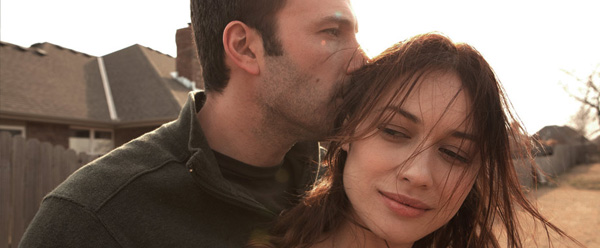For the most loyal of Malick fans only…and even they may not like it.
The H-Bomb: If pretty pictures alone made for a great film, then To the Wonder would be far and away the best movie of the year. As is the case with pretty much all of writer/director Terrence Malick’s pictures, the cinematography is breathtakingly spectacular, and makes it worth seeing on the largest screen possible…for maybe ten or fifteen minutes. A film can have the most beautiful imagery from beginning to end, but if an engaging story and interesting characters fail to emerge, then the film will ultimately falter. As an admirer of Malick’s work, it pains me to say that’s exactly what happens here.
To the Wonder essentially plays like an artsy-fartsy version of Blue Valentine, which is odd, since I thought that Blue Valentine was the artsy-fartsy version of Blue Valentine. The story, such as it is, is about an American, Neil (Ben Affleck), who starts a whirlwind romance with Marina (Olga Kurylenko) while in Paris. They then move back to Neil’s hometown in rural Oklahoma, and from there the film covers the ups and downs of their relationship…in the most abstract way imaginable.
Very little dialogue is exchanged between our two leads, as Affleck has about ten lines in the entire film, and Kurylenko’s voice over, which is spoken in French, is the typical kind of poetic musings we’ve come to expect from Malick these days. Most of their romance is conveyed through them embracing and frolicking through various scenic backdrops, such as the streets of Paris and the fields of Oklahoma…if there’s one thing Malick does manage to get across with resounding clarity, it is that your typical American suburb is pretty drab and nondescript when compared to any Parisian block.
It’s a romance that blossoms, then sours, then rekindles, then sours again. All of this is interspersed with gorgeous, twirling shots of nature, lengthy takes of our leads staring off into nothing like they’re deep in thought, and classical music that comprises the bulk of the soundtrack. That’s really about all there is to this film, when all is said and done. With Malick’s earlier films, particularly The Thin Red Line and The Tree of Life, I felt that there was a deeper philosophical point being made beyond the dreamy tone and the ponderous, at times silly, voice overs. In To the Wonder, the dreamlike tone is expertly recaptured, but this time I sensed that there really wasn’t a whole lot of anything going on underneath the surface, and that left me underwhelmed and disappointed.
As for the acting, the performances have always been more or less beside the point in a Malick film, but here, I feel as though the cast was totally shortchanged. I sensed that Affleck and Kurylenko could have had fine chemistry together, but their characters are never allowed to develop in a way that I could invest in them. This is the complete opposite reaction I had to the love affair between John Smith and Pocahontas in Malick’s The New World, where the characters shared very little dialogue with each other, but at least I was made to care for them as individuals and their relationship. Malick completely fell short in accomplishing that this time around.
It’s not enough that the central romance fails to register, there’s also a half-baked subplot involving Rachel McAdams, who shows up for about ten minutes as a past love of Neil’s, with whom he has a brief fling. This is something that could’ve been excised from the film entirely, and no one ever would have missed it. Another story thread, one that just left me scratching my head, involves a Spanish priest, played by Javier Bardem, who is undergoing a crisis of faith. The film leaves Affleck and Kurylenko at several points to focus on this priest’s story, but aside from a few fleeting moments he shares with Kurylenko, I’m not entirely sure how this character was relevant to anything else in the movie. Perhaps the idea is that the priest and Marina are two strangers struggling to find their place in a strange land, but that was the only real connection I could make.
And that sums up my main issue with To the Wonder, I just could not connect with it in the way I could with Malick’s previous works. I’m usually the first one to defend this filmmaker against those who would simply dismiss him as a pretentious jerk-off [like our editor, Rick Swift], but this time, I’m afraid to say I’m more on the side of the naysayers. It felt less like Malick had a clear sense of what he wanted to do or say with this film, and more like he had just shot a bunch of random footage and decided to figure it all out in the editing room. That, for me, was truly a let down.
Now, I should stress that I didn’t entirely dislike the film, as it is visually every bit as splendid as his others, and I was with it up to a point. It was when I realized there was less to it than meets the eye, that I lost interest. Perhaps I missed something. Perhaps others, like the late Roger Ebert (whose last review was written for this film), will get more out of it than I did. Terence Malick is nothing if not polarizing, after all, and some may find some substance within To the Wonder that’s worth pondering…I personally did not. As far as I’m concerned, this is his first miss.




